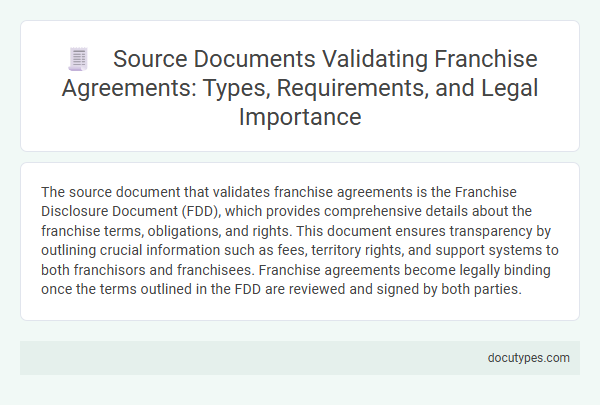The source document that validates franchise agreements is the Franchise Disclosure Document (FDD), which provides comprehensive details about the franchise terms, obligations, and rights. This document ensures transparency by outlining crucial information such as fees, territory rights, and support systems to both franchisors and franchisees. Franchise agreements become legally binding once the terms outlined in the FDD are reviewed and signed by both parties.
Introduction to Source Documents in Franchise Agreements
Source documents are critical in validating franchise agreements by providing the legal foundation and detailed terms agreed upon by both parties. Understanding these documents ensures clarity on rights, obligations, and operational guidelines within the franchise relationship.
- Franchise Disclosure Document (FDD) - This document offers comprehensive disclosure of the franchise system, financial performance, and legal obligations, serving as a primary validation source.
- Franchise Agreement - The legally binding contract outlines specific rights and duties between franchisor and franchisee, confirming the agreement's enforceability.
- Operating Manuals and Addenda - These supplementary documents provide detailed operational standards and any updates, reinforcing the terms stated in the primary agreement.
Key Types of Source Documents for Franchise Validation
Franchise agreements are primarily validated through key source documents such as the Franchise Disclosure Document (FDD), which provides essential details about the franchise offering. Your Franchise Agreement itself serves as a critical legal contract outlining the rights and obligations between franchisor and franchisee. Additional validation may come from state registration documents and financial statements that support the authenticity and compliance of the franchise arrangement.
Regulatory Requirements for Franchise Agreement Documentation
Franchise agreements must be validated by specific source documents to ensure compliance with regulatory requirements. These documents provide the legal foundation and enforceability of the franchise relationship.
- Franchise Disclosure Document (FDD) - The FDD offers detailed information about the franchise, satisfying federal and state disclosure regulations.
- Executed Franchise Agreement - This signed contract between franchisor and franchisee legally binds both parties to agreed terms and conditions.
- State-Specific Filings - Certain states mandate registration or approval of franchise agreements to meet local regulatory standards.
Proper validation through these documents secures regulatory compliance and protects all parties involved in the franchise agreement.
Essential Elements in Validating Franchise Agreements
The primary source document that validates franchise agreements is the Franchise Disclosure Document (FDD). This document contains crucial information ensuring compliance with legal standards.
Essential elements in validating franchise agreements include clear identification of parties involved, detailed terms and conditions, and disclosure of fees and obligations. The FDD must outline your rights and responsibilities as a franchisee, ensuring transparency. Comprehensive validation depends on reviewing all financial, legal, and operational details within the document.
Legal Importance of Accurate Source Documents
The source document that validates franchise agreements is the Franchise Disclosure Document (FDD), which provides crucial information about the franchisor, the franchise system, and the terms of the agreement. Accurate source documents ensure legal compliance with federal and state regulations, protecting both franchisors and franchisees from disputes. Precise documentation supports enforceability in courts, reinforcing the franchise agreement's legitimacy and transparency.
Role of Disclosure Documents in Franchise Agreements
| Source Document | Role in Validating Franchise Agreements |
|---|---|
| Disclosure Documents (Franchise Disclosure Document - FDD) | The Franchise Disclosure Document (FDD) serves as the primary source validating franchise agreements. It provides comprehensive information about the franchise system, legal obligations, financial performance, and risks associated with the franchise. These disclosure documents ensure transparency, enabling you to make an informed decision before entering into a franchise agreement. The FDD outlines essential terms and conditions, helping to verify the legitimacy and enforceability of the franchise contract. |
| Franchise Agreement | The franchise agreement itself is a legally binding contract between the franchisor and franchisee. However, its validity heavily depends on the accuracy and completeness of the information disclosed in the FDD. Disclosure documents complement the franchise agreement by providing the foundation that supports its terms. |
| State-Specific Registration Documents | Certain states require franchisors to register their disclosure documents before offering franchises. These registration documents act as an additional validation layer, ensuring compliance with state laws. They confirm that disclosure materials meet regulatory standards, which in turn strengthens the validity of the franchise agreement. |
Common Challenges in Document Validation
Franchise agreements are typically validated by the original signed contract provided by the franchisor, known as the source document. This document serves as the primary legal reference, ensuring all terms and obligations are clearly outlined and enforceable.
Common challenges in document validation include verifying authenticity and completeness, as missing signatures or altered clauses can undermine the agreement's validity. You must carefully cross-check dates, seals, and witness signatures to avoid disputes or legal complications during the franchise relationship.
Best Practices for Maintaining Source Document Compliance
The source document that validates franchise agreements is the Franchise Disclosure Document (FDD), which outlines all terms and obligations. Maintaining compliance with this critical document ensures your franchise operates within legal and contractual standards.
- Thorough Documentation - Keep original signed FDDs securely stored to prove authenticity and agreement validity.
- Regular Audits - Conduct frequent reviews of franchise agreements against the FDD to prevent discrepancies and regulatory issues.
- Consistent Updates - Ensure all changes in franchise terms are documented and compliant with updated franchise laws and filed appropriately.
Consequences of Inadequate Documentation in Franchising
The source document that validates franchise agreements is the Franchise Disclosure Document (FDD). This document provides essential information verifying the terms and obligations between franchisor and franchisee.
Inadequate documentation in franchising can lead to legal disputes and financial losses. Without proper validation, neither party is fully protected, increasing the risk of contract breaches and misunderstandings.
Which Source Document Validates Franchise Agreements? Infographic

